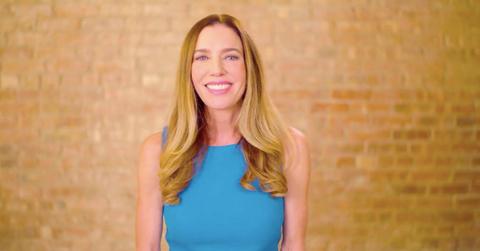Jennifer Barrett is on a mission to help women break cultural barriers and go after a world of financial freedom.
As an author, executive, and financial expert, Barrett invites women into her journey of what it means to take financial responsibility to create the lives they want. In her book, Think Like a Breadwinner: A Wealth-Building Manifesto for Women Who Want to Earn More (and Worry Less), she reframes what it means to be a breadwinner and the importance of women building their own wealth.
Following her career as a financial journalist for publications such as The Wall Street Journal, TheStreet.com, and The New York Times, Barrett transitioned into management. She carried leadership roles such as General Manager of Hearst Digital, Chief Education Officer at Acorns, and currently holds the role of Head of Content at Fidelity Investments. With her knowledge, she bridges the gap in education around investing. Barrett is an agent to not just women, but people who desire to build their wealth. Through sharing about her own journey, and the steps she has taken to be a proud breadwinner, Barrett offers an abundance of insight for us all.
Her Agenda: Can you describe your early career? How did you break into financial journalism, specifically at the Wall Street Journal?
Jennifer Barrett: I was a broadcast journalism major at Syracuse, but in my junior year I was abroad in London and had a print journalism class that was very hands-on. We were out reporting on stories and I loved it, but it was a little late to change my major. My advisor suggested I start writing for the newspaper. Coming out of school, I probably wasn’t as well equipped as some people to land a print journalism job, certainly not at the (Wall Street) Journal.
I spent a few years working my way up from a small-town newspaper, alternatively weekly, the Arizona Republic. Then at the Republic, I had a great female sponsor who was the news editor and had given me the opportunity to write some front-page stories which won some awards. A friend in New York had mentioned there was an open position at Dow Jones.
I had a pretty good portfolio that I could put together and apply for the job. So when I got there, a few weeks in, I was partnered with someone to cover foreign exchange. She quit suddenly during lunch and I immediately became the writer penning The Wall Street Journal Foreign Exchange column every day. I kind of got thrown right in pretty early on. It was a steep learning curve, and one I had to climb pretty quickly. But I’m really glad for the experience because it gave me a lot of confidence and it also piqued my interest in business journalism.
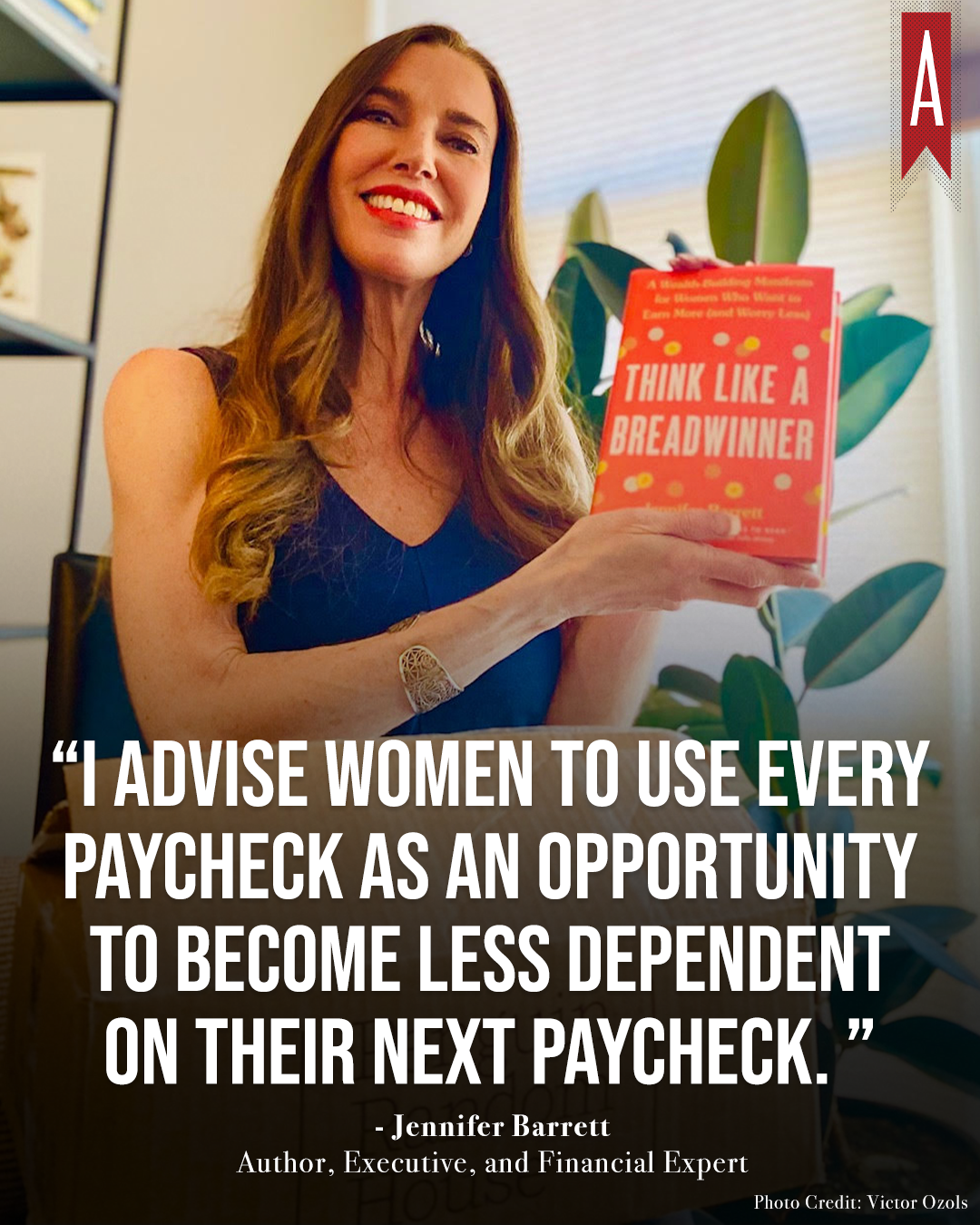
Her Agenda:Did you always know you wanted to be in financial journalism?
Jennifer Barrett: Yes, I knew that I wanted to be a journalist from a very young age. I think probably in middle school, I was about twelve or thirteen and my parents used to get Newsweek. We lived in Texas and one day I just picked up, I looked at Newsweek and asked if I could read it. I read it cover to cover and I had this moment of like a light bulb going off and I thought, “Oh my God, you can get paid for this? You get to interview really interesting people and you can travel all over and write for a living?” It was this combination of so many things that I enjoyed.
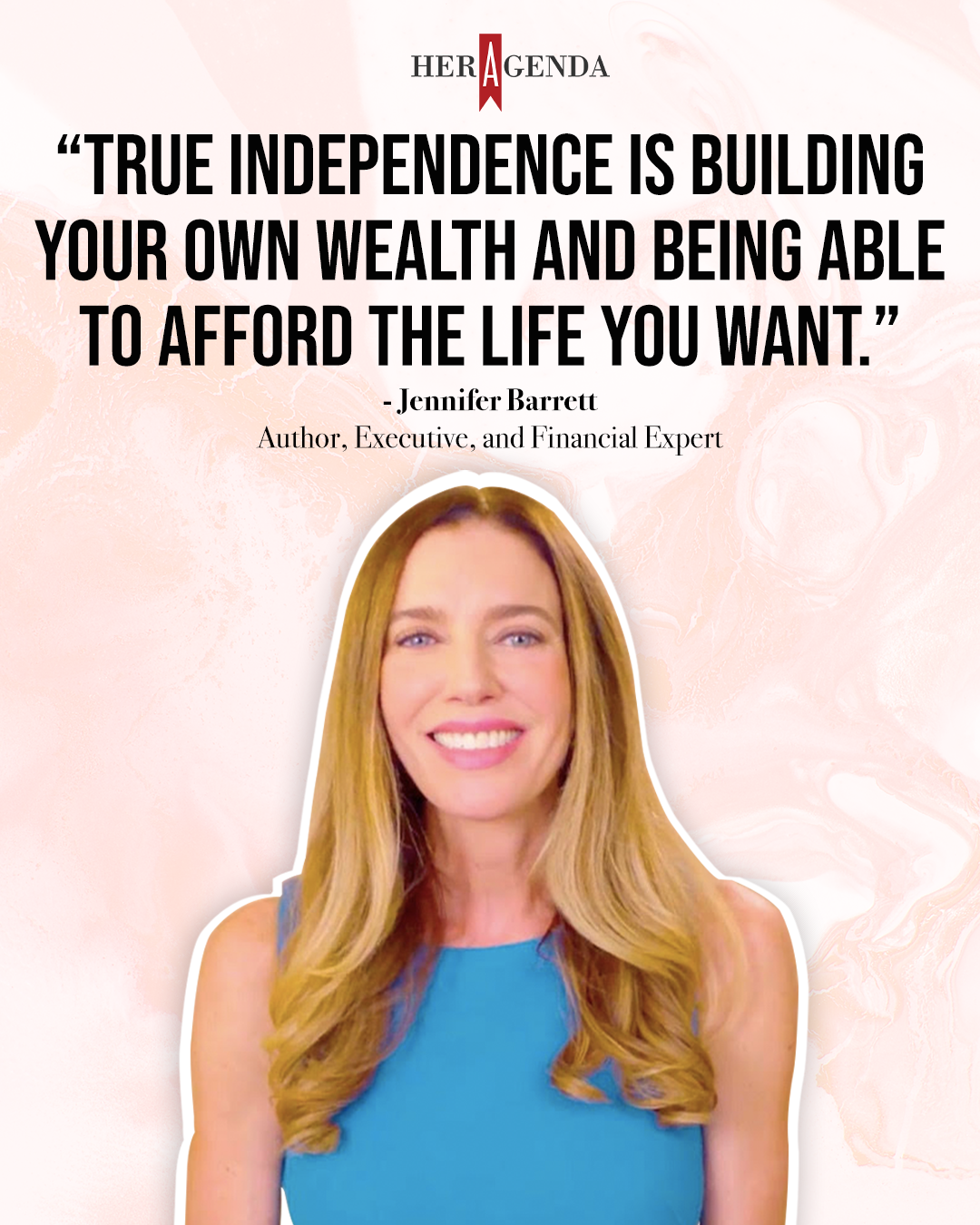
Her Agenda: What was the “moment” you knew you wanted to transition from journalism to management?
Jennifer Barrett: I still think like a journalist and I still approach life in a lot of ways as a journalist. I never really lost my passion for journalism.
There was one particular moment. At the time that I took the job [management role], we had one son, and we wanted to buy a place. I was freelancing, and I had two job offers on the same afternoon. One was to write a column for a national magazine, which was a dream of mine. The other was this managerial role, and the offer had come from someone I’d worked with in Newsweek. I had a sense of the salary, and the other job was a contract role. It was a very difficult decision at the time, but it came down to me really wanting to set myself on a track financially and professionally. I wanted to be able to support the life and the family I wanted. Things moved pretty quickly and I am very grateful that I chose that path. I’ve learned a lot along the way, and I obviously wouldn’t be in the role I’m in today had I not taken that first step.
Her Agenda: How did your journalism career prepare you for these leadership roles?
Jennifer Barrett: I think as a journalist, I’m very curious and I ask a lot of questions. We’re trained as journalists to write in a way that’s accessible – to take complex subjects and distill them down into an article. That is an incredibly important skill to have, to have the ability to delve deep into a subject, to research it, to understand it, to understand what sources you can trust. Then when you know that, you have to then go and tell someone about it in a way that they can understand it, you learn about that [topic] at a much deeper level. I still take that approach to a lot of topics, and it certainly serves me well in this role.
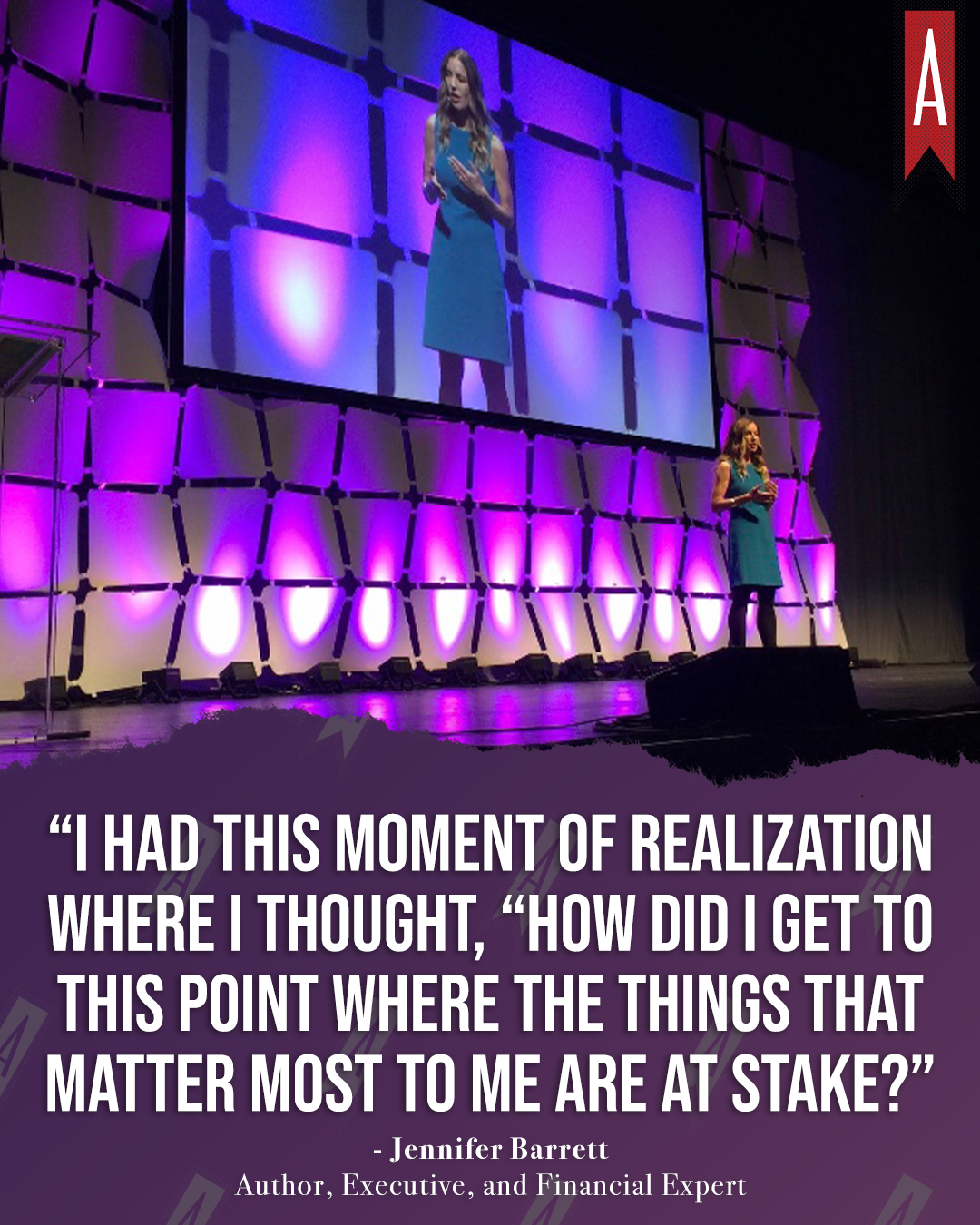
Her Agenda: Specifically at Acorns and at the beginning of the COVID-19 pandemic, did you see women users pull money from investments or using the platform?
Jennifer Barrett: I think that’s a good example of where content and education can make a big difference. At Acorns and Fidelity, we are constantly hitting home the benefits of dollar-cost averaging, investing as the market goes up and down, the risks of trying to time the market or panic selling.
One of the most powerful things I remember at Acorns was we had a lot of new, younger investors who hadn’t had the history and we were just zooming out to show how the market has behaved over the last hundred years or even the last fifty years that every downturn has ended in an upturn. When you see historically how much the market has grown, I think that perspective is really important for investors in understanding the benefits of sticking with it. In the case of Acorns users and specifically for women, we did not see many people pulling money out when the market dropped. I think that had a lot to do with the very consistent educational messaging around the importance and benefits of sticking with it.
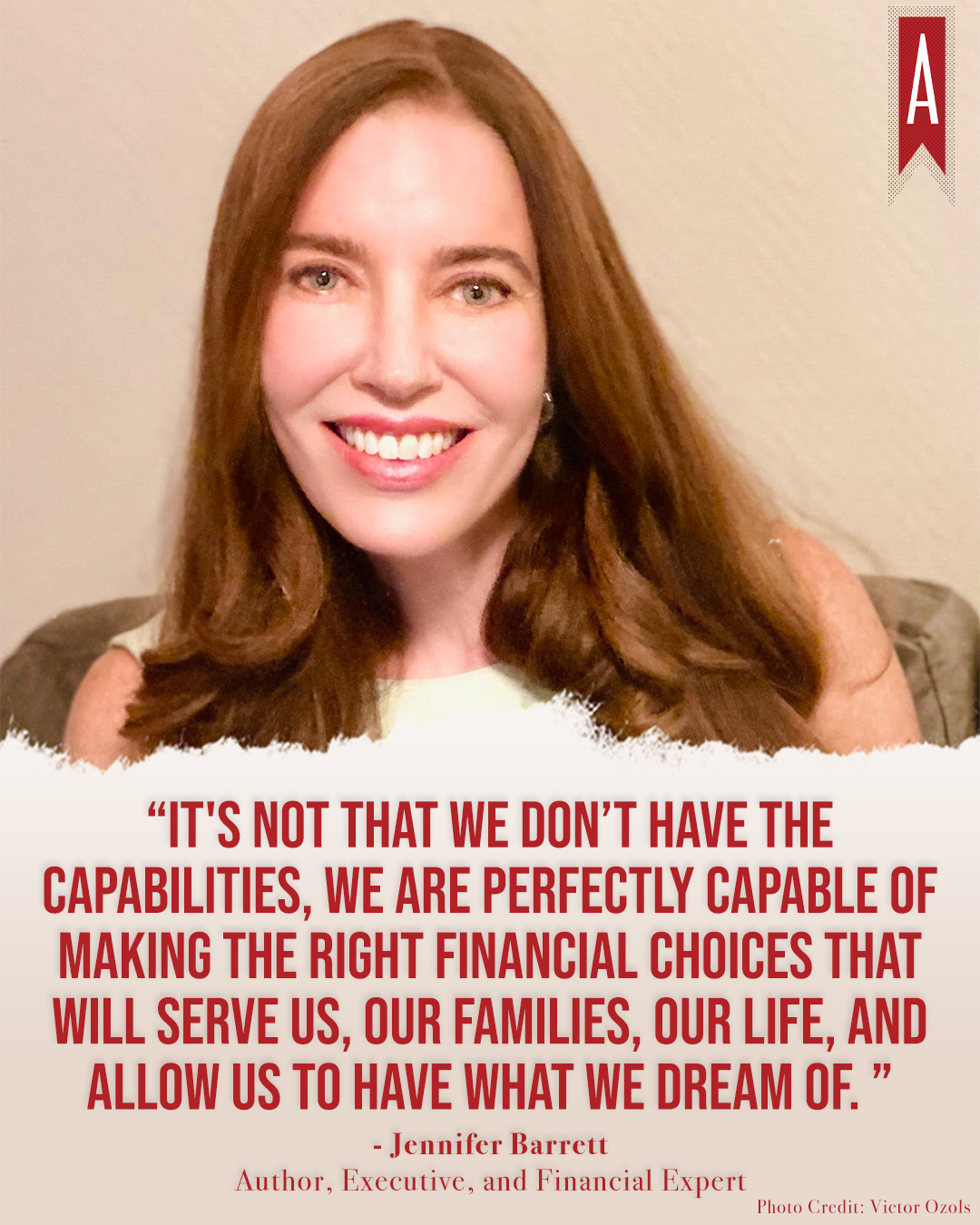
Her Agenda: How do you define financial freedom?
Jennifer Barrett: I think there are a few aspects to it. I advise women to use every paycheck as an opportunity to become less dependent on their next paycheck. Ultimately financial freedom to me is not being dependent on a paycheck – having built up enough in investments that you are earning enough money off those investments to at least cover the basics. That is an incredible amount of freedom to not be dependent on a particular job to be confident that you can support yourself, your future, the people, and the causes that you care about. That to me is financial freedom.
You can experience financial freedom to some degree at different points in your life without being fully independent of any income outside of your investment income. I think that really is the goal, and that’s a very different message than a lot of women get.
We’ve normalized living paycheck to paycheck. We’ve normalized debt in this country. We’ve normalized living paycheck to paycheck and being in debt, and that is is really the opposite of financial freedom. There’s been this conditioning around independence that independence means having your own income and being able to pay the bills. But true independence is building your own wealth and being able to afford the life you want. That was the big distinction to me that got me thinking about the book in the first place. This idea of independence that I’d grown up with wasn’t true independence and if I held on to that old definition, I would have missed out on a lot of things that were really important to me in my life.
-Financial freedom to me is not being dependent on a paycheck – having built up enough in investments that you are earning enough money off those investments to at least cover the basics. That is an incredible amount of freedom to not be dependent on a particular job to be confident that you can support yourself, your future, the people, and the causes that you care about.
Jennifer Barrett
Her Agenda: How do you think millennial and Get Z women can expand their financial possibilities with the student loan debt crisis?
Jennifer Barrett: Yeah, that certainly doesn’t help, does it? More than one trillion dollars in student debt, for starters, we could lower the cost of higher education. That would be a great start. But barring that, if you’re asking what individuals can do it’s important to have this mindset of getting into positive net worth – building wealth, and it doesn’t mean that you’ll be out of debt tomorrow. I have a mortgage, but I’m building equity at the same time. I think it’s a little bit different, but it doesn’t mean not having any debt whatsoever. It’s a focus on building your own wealth – focusing on earning more so you can afford a better lifestyle. [I suggest] using your paycheck to save, to invest, to pay down your debt, and to have a plan around that. So even if you have that debt, you know that you’re working towards something. I’m not saying that this is easy. I can’t imagine it. I was very fortunate that my parents paid for my college.
I think the average debt right now for those carrying student loans is somewhere around thirty-five thousand. To come out of school and feel like you’re thirty-five thousand dollars behind the starting line is really tough. A lot of people aren’t going to be able to pay that off in less than 10 years. If you are able to pay that debt down more quickly, that’s great. For federal loans, the interest rate is not so bad. Credit card debt, that’s crippling. That’s when I started to have my wake-up call. I know what it feels like to be in that position, and I can say that you can come out the other side and set yourself up for success.

Her Agenda: You describe writing Think Like A Breadwinner as “inspired by my own wake-up call and journey to financial freedom.” What was that wake-up call?
Jennifer Barrett: There was one particular moment that was the turning point for me. At the time my husband and I were sharing a small one-bedroom apartment rental in Brooklyn, which was not unusual in New York City. I was paying half the rent and bills with my husband. I had a small 401K, and a little savings. I was paying down my credit card debt and I thought I was doing okay. We also had a toddler at the time and we were sharing our bedroom with him.
I remember one night I was up with him. He’d woken up in the night and I was pacing back and forth across our bedrooms, trying to get him back to sleep. I started looking around our apartment and it really hit me that we were in an unsustainable situation. Even though I thought that I was pretty independent, I wasn’t in a position financially at that point to get us out of the situation to help us buy a place or even rent a bigger place. I couldn’t be sure that we could afford a second child, which my husband and I both really wanted and all of those things: the ability to stay in New York, to have the space to expand our family, these things were so important to me, and I realized I had not saved or invested to help us afford them. I was still living almost paycheck to paycheck, and so I had this moment of realization where I thought, “how did I get to this point where the things that matter most to me are at stake?” I started looking back at the many choices that I made trying to figure out where I went wrong. I realized that deep down at an unconscious level, I assumed that my husband would be the one to take care of that just as my own dad had.
He’d been the sole or primary breadwinner throughout my childhood. I asked myself in that same moment if I’d been raised to believe that I would be fully financially responsible for myself, my family and in other words, if I’d been raised to think like a breadwinner? How would that change the choices I made with my money, my career? The answer to that really changed the whole trajectory, not just to my finances, but my life. It transformed my relationship with money.
I started to ask, “why aren’t we raised this way? Why are we still conditioned to believe that we are not responsible for that piece of our life?” When you get to the point where I was, where you realize, “what if your husband lost his job? What if you can’t count on someone else? What happens to your dreams? What happens to the things that are so important to you?” That was really not just the genesis of the book, but I started to make very different choices with my money. That set me off on an entirely new trajectory.
Her Agenda: While doing research for your book, what is the most common barrier for women when trying to Think Like A Breadwinner?
Jennifer Barrett: Cultural conditioning. Sometimes it’s so deeply ingrained in us that we don’t even see it, and yet these beliefs have been driving the decisions that we make with our money. It’s such a deep level that it takes some work to really uncover the beliefs you have about yourself, your capabilities, your opportunities. Your beliefs drive those decisions and then you make a conscious choice to shift them so that you are going in a direction that you want to be and you end up where you want to be. It’s not that we don’t have the capabilities, we are perfectly capable of making the right financial choices that will serve us, our families, our life, and allow us to have what we dream of. We are one hundred percent capable and it was never a question of our competency. It was a question of our confidence and the kind of belief that we’ve been raised with it that dictates the choices that we make.
Her Agenda: After publishing Think Like A Breadwinner, what tools, stories, or insights have you noticed resonate the most with your readers? How have you seen your readers grow in terms of their financial success?
Jennifer Barrett: I’ll tell you what I love is when people ping me and I say, “after I read your book, I _______.” It’s sometimes like, “I opened an IRA. I started investing. I asked for a raise.” That makes me so happy. When I get notes like that, that is about the most fulfilling thing. But I do find there are a few.
The investing chapter resonated a lot with people. It is all about kind of stripping away the myths we have around investing that prevent so many of us from getting in the game. The other one that resonates a lot, I think, and resonated with me was while I was doing the research, I had my own wake-up call around things like office housework. How we as women are more apt to pick up non-promotable work in the workplace. I recognized ways that I was doing that myself and put a stop to that. People would read it and say they could see themselves in the stories that I shared. I interviewed over 100 women and I had a wide variety of stories. They would see themselves in their stories or they would see themselves in the research. I also gave a whole perspective on when I moved into management, how it shifted my perspective on negotiation and asking for the job offer you deserve. Especially to understand your market value and all of those things. I think those are conversations a lot of women haven’t had, or they’re still kind of fearful of asking. Having that additional perspective was helpful to people who aren’t in management and hadn’t had that access before.

